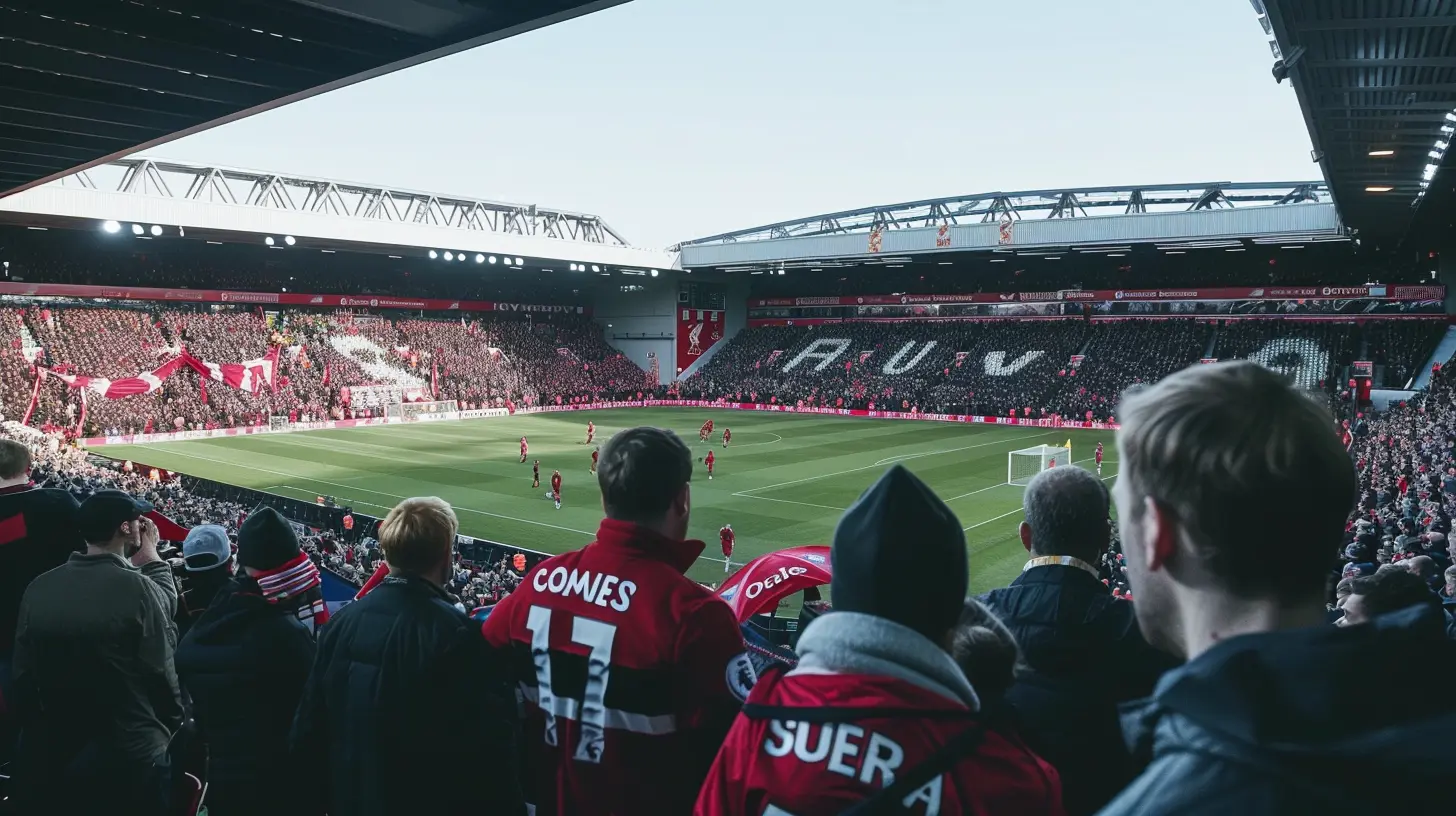The Evolution of Fan Engagement in Club Teams
1 April 2025
In the world of sports, it's not just the players and coaches who define a team's success—it's the fans. Fans are the heart and soul of any club, and over the years, the way clubs engage with their supporters has undergone a massive transformation. From roaring stadium crowds to digital communities, fan engagement has evolved dramatically.
But what exactly does "fan engagement" mean today? And how did we get from chanting in the stands to tweeting in real-time with our favorite players? Let's dive into the fascinating journey of fan engagement in club teams and see how it has transformed in the digital age.

The Early Days: Physical Presence Was Everything
Back in the day, engaging with your favorite club meant one thing—showing up in person. Fans would flock to stadiums, cheering for their teams from the stands, waving flags, and singing their hearts out. The louder the crowd, the more intense the energy, and the more connected you felt to the team.Stadiums were the heart of fan engagement. If you wanted to support your team, you had to physically be there. This was a time when being a fan was a local affair. If you lived near the stadium, you were a regular; if you lived far away, you were out of luck. There was no social media, no live streaming, and frankly, no other way to interact with the club unless you attended the match or read about it in the papers the next day.
The Rise of Radio and TV
The introduction of radio and television in the mid-20th century marked the first major shift in fan engagement. Suddenly, you didn't have to be in the stadium to follow your team. You could tune in from the comfort of your home or car and listen to live commentary or watch games on TV. This opened up the world of sports to a much broader audience.Radio and TV brought fans closer to the action, but it was still a one-way street. You could listen or watch, but there was no way to interact directly with the club or other fans. Engagement was still passive—you were a recipient of the experience rather than an active participant.

The Internet Revolution: The Game Changer
Then came the internet—and everything changed.The internet wasn't just a game changer for fan engagement; it was the game changer. Suddenly, fans could connect to their favorite teams and fellow supporters from anywhere in the world. No longer confined to local communities, fanbases became global, and the ways in which clubs engaged with their supporters started to shift dramatically.
The Birth of Online Communities
The early 2000s saw the rise of online forums and fan websites. These virtual communities allowed fans to discuss games, share opinions, and even organize meet-ups. For the first time, fans had a platform to interact with each other outside the confines of the stadium.Clubs quickly realized the potential of these online communities. Initially, fan engagement was somewhat unofficial—run by die-hard supporters rather than the clubs themselves—but soon, teams started to create their own websites and forums to connect with their fans.
The Social Media Era
If the internet was the first big shift, social media was the second. Platforms like Facebook, Twitter, and Instagram completely revolutionized how clubs interacted with their supporters. Suddenly, fans could follow their favorite players, get instant updates, and even engage in conversations with the club itself.Social media flipped the script on fan engagement. No longer were fans passive recipients; they became active participants. Clubs began to realize that engaging with fans on social media wasn't just a nice-to-have—it was essential. Teams could build loyalty, create a sense of community, and even generate revenue through targeted social media campaigns.
Real-Time Interactions
Another major shift brought by social media was the ability to engage in real-time. Whether it's live-tweeting during a game or posting behind-the-scenes footage on Instagram stories, clubs now keep their fans engaged 24/7.This real-time interaction makes fans feel like they're part of the team’s journey. They're not just spectators; they're insiders, getting an all-access pass to everything from post-match celebrations to training ground banter.

The Rise of Fan-Generated Content
One of the most interesting developments in the evolution of fan engagement is the rise of fan-generated content. With the advent of smartphones and social media, fans now have the tools to create their own content—whether it's a meme, a highlight reel, or even a podcast.Clubs have embraced this trend, often sharing fan-generated content on their official platforms. This not only strengthens the relationship between the club and its supporters but also creates a sense of ownership. When a fan sees their content shared by the club, it heightens their emotional investment in the team.
User-generated content has also blurred the lines between fans and influencers. Some fans, especially those with large social media followings, have become unofficial ambassadors for the club, promoting the team to their own audiences. It’s a win-win situation: the club gets free promotion, and fans get recognition.

Fan Engagement in the Age of Streaming and Apps
As technology evolves, so too does fan engagement. The rise of streaming services has made it easier than ever to follow your favorite team, no matter where you are in the world. You no longer need a cable subscription to watch games; you can stream them directly from your phone, tablet, or laptop.But it doesn't stop there. Clubs have started to develop their own apps, offering fans an immersive experience that goes beyond just watching the game. From live stats and push notifications to exclusive content and virtual reality experiences, apps are becoming the new frontier of fan engagement.
Virtual Reality (VR) and Augmented Reality (AR)
Speaking of immersive experiences, VR and AR are taking fan engagement to a whole new level. Imagine putting on a VR headset and feeling like you're sitting in the front row of the stadium, even if you're halfway across the world. Or using AR to get real-time stats on your phone while you're watching the game.These technologies are still in their early stages, but they have the potential to revolutionize how fans engage with their favorite teams. Clubs are experimenting with VR and AR to create more interactive and personalized experiences, and it's only a matter of time before these technologies become mainstream.
The Role of Data in Fan Engagement
Data is the new currency in fan engagement. Clubs are increasingly using data analytics to understand their fans better and tailor their engagement strategies accordingly. From tracking social media interactions to analyzing ticket sales and merchandise purchases, data allows clubs to create personalized experiences for their supporters.For example, if a fan regularly engages with the club on Twitter and buys merchandise from the online store, the club can target them with personalized offers and content. This data-driven approach not only enhances the fan experience but also helps clubs build deeper, more meaningful relationships with their supporters.
The Power of Fan Feedback
In today's world, fan feedback is more important than ever. Social media has given fans a voice, and clubs are listening. Whether it's through polls, surveys, or social media comments, clubs are actively seeking input from their supporters to improve the fan experience.This feedback loop creates a sense of ownership among fans. When supporters feel like their opinions matter, they're more likely to stay loyal to the club. It also allows clubs to stay in tune with the needs and desires of their fanbase, ensuring that they're delivering the best possible experience.
Fan Voting and Decision-Making
Some clubs have taken fan engagement to the next level by involving supporters in decision-making processes. For example, clubs like Barcelona and Real Madrid have a "socios" system, where fans pay a membership fee and have a say in important club decisions, such as electing the club president.While this level of fan involvement is rare, it's a powerful example of how clubs can engage with their supporters on a deeper level. It shows that fans are more than just customers—they're stakeholders in the club's success.
The Future of Fan Engagement
So, what does the future hold for fan engagement in club teams? One thing is for sure: it will continue to evolve as technology advances. The next frontier could be anything from AI-powered chatbots that interact with fans to blockchain-based loyalty programs.But no matter how much technology changes, one thing will remain constant: the need for connection. At its core, fan engagement is about building relationships—between the club and its supporters, and among the fans themselves.
As long as clubs continue to prioritize these relationships, fan engagement will continue to thrive, no matter how the landscape evolves.
Conclusion
The evolution of fan engagement in club teams has come a long way from the days of shouting from the stands. With the rise of the internet, social media, streaming, and new technologies like VR and AR, fans are more connected to their teams than ever before. Clubs have recognized the importance of engaging with their supporters, and they’re continually finding new ways to keep fans involved and invested.Whether it's through real-time social media interaction, fan-generated content, or personalized experiences driven by data, the relationship between clubs and their supporters is stronger and more dynamic than ever. And as technology continues to evolve, the future of fan engagement looks brighter than ever.
all images in this post were generated using AI tools
Category:
Club TeamsAuthor:

Umberto Flores
Discussion
rate this article
10 comments
Juliana McKinley
Unseen forces drive passion; loyalty transcends mere fandom.
April 11, 2025 at 8:26 PM

Umberto Flores
Absolutely, it's the emotional connections and shared experiences that elevate fandom into a deeper sense of community and loyalty.
Edith McMurtry
This article expertly highlights the transformation of fan engagement in club teams, from traditional methods to modern digital strategies. It emphasizes how social media, interactive platforms, and community involvement are reshaping the fan experience, fostering deeper connections between clubs and supporters.
April 9, 2025 at 11:55 AM

Umberto Flores
Thank you for your insightful comment! I'm glad you found the article highlights the critical shift in fan engagement through digital innovation and community involvement.
Oriana Robinson
Fan engagement is no longer a passive experience; it's an exhilarating revolution. Clubs must embrace bold innovations, leveraging technology and direct interaction to truly connect. Anything less is a disservice to the passionate communities that fuel their success. Step up, or step aside!
April 9, 2025 at 3:46 AM

Umberto Flores
Thank you for highlighting this crucial shift! Embracing technology and direct engagement is indeed vital for clubs to connect with their passionate fan bases. It's an exciting time for fan engagement!
Maribel Montgomery
This article captures the dynamic shift in how clubs connect with their fans. The rise of social media, interactive events, and personalized content has transformed engagement. It's fascinating to see how technology bridges distances, creating stronger community ties and enhancing the overall fan experience.
April 8, 2025 at 8:58 PM

Umberto Flores
Thank you for your insightful comment! I'm glad you found the article highlights the significant impact of technology on fan engagement and community building.
Rook Romero
From bleachers to screens—engagement evolved!
April 8, 2025 at 12:56 PM

Umberto Flores
Absolutely! The shift from in-person to digital platforms has transformed how fans connect with their teams, making engagement more interactive and accessible than ever.
Rayna McIlwain
This article offers valuable insights into how fan engagement has transformed over the years. It's fascinating to see how technology and social media have shaped the relationship between clubs and their supporters. Great read! Thank you for sharing!
April 7, 2025 at 4:01 AM

Umberto Flores
Thank you for your thoughtful comment! I'm glad you found the insights on fan engagement and technology fascinating.
Asher Burton
This article brilliantly captures the transformation of fan engagement in club teams. From traditional methods to technology-driven approaches, it’s fascinating to see how clubs are leveraging social media, virtual experiences, and personalized content to deepen connections. Excited to see where this evolution takes us next!
April 4, 2025 at 8:07 PM

Umberto Flores
Thank you for your insightful comment! I'm glad you found the article engaging and appreciated the shift towards technology-driven fan engagement. It's an exciting time for clubs and fans alike!
Gideon O'Neal
Great article! It’s inspiring to see how fan engagement has evolved, creating stronger connections between clubs and supporters. Excited to see where this journey leads next!
April 4, 2025 at 10:35 AM

Umberto Flores
Thank you! I'm glad you found it inspiring—fan engagement truly is evolving, and I can't wait to see what the future holds!
Sablethorn Snyder
Fan engagement isn't just a trend; it’s the lifeblood of club teams. Embrace innovation, demand authenticity, and never settle for less than genuine connection!
April 3, 2025 at 11:25 AM

Umberto Flores
Absolutely! Genuine fan engagement is crucial for club success, fostering loyalty and enhancing the overall experience. Embracing innovation while staying authentic is key to building lasting connections.
Zayla Black
This article brilliantly captures the transformative journey of fan engagement in club teams. From traditional methods to innovative digital strategies, it highlights how clubs are adapting to enhance connections with fans. The emphasis on community and interaction is crucial for the future of sports fandom. Well done!
April 3, 2025 at 4:07 AM

Umberto Flores
Thank you for your kind words! I'm glad you found the article insightful. Fan engagement is indeed evolving, and it's exciting to see how clubs are embracing new strategies.
MORE POSTS

The Benefits of Outdoor Workouts: Fresh Air and Fitness

Golf Fitness: Exercises to Increase Your Drive Distance

The Benefits of Cross-Training for Tennis Players

Hockey and Analytics: How Data is Changing the Game

Performance Enhancing Fabrics: The Science Behind Modern Sportswear

The Most Memorable Upsets in Grand Slam Tennis History
Tennis Fashion: A Look at Iconic Outfits Over the Decades